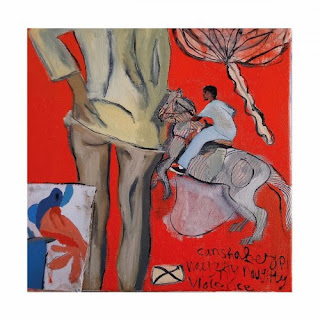Ruminative and Quirky Mix
Last night at the Phoenix, Exeter, was top-class as musical
entertainment: headline act the great Chris Smither in ruminative form and
playing a large slice of songs from his latest outstanding album Call Me Lucky [reviewed here]; and as is
so often the case with a support act, the wonderful discovery of new-to-me
talent, this time The Suitcase Junket, Matt Lorenz as a one man band igniting
the evening with singing into the amped hole of his guitar – reverberating
vocal yet never twirling his twirlable moustache though still indicating a set
of evil delights. Well, evil if expressing love for a chicken called Jackie.
Starting with Lorenz, a clearly talented musician/performer
who played on Smither’s latest album, his one-man instrumental set-up packed a
punch, mainly percussive, with beats on his seat-suitcase, a high-hat, a pot
and a circular-saw blade.
With plenty of volume on the guitar and some effects,
we were treated to cool slide and pulsing riff-rock as well as gentler acoustic
songcraft. Lorenz is also a fine vocalist and has lines in setting his
background and personal proclivities that engage as much as the music. The
blues informed plenty of his playing, and a distinctive element of his act is
throat-singing, inspired by a South Indian cooking class. He also gave us a sax
solo via pursed lips. As I typed the above I have been listening to his latest album Pile Driver which is superb in capturing
the live element of his playing with over-dubs and extras. What a treat and
pleasure to be introduced to this musical artist – you can get Pile Driver here [Why So Brief? is a glorious, sweet blues].
The third time I have had the privilege of seeing Smither
play live, this evening’s set was, as I have said, ruminative and illustrative,
one narrative most insightful and honest about his songwriting process, leading
into a gorgeous performance of Down to
the Sound, that background story informing the lyric perfectly for its
moment. Indeed, the live performance accentuates Smither’s lyrical talents,
whether political – he did refer to ‘agent orange’ but also lamented, on our
behalf, the current British political scene – or songs about love, those
performed being quite affecting. On writing songs Smither refers to their
transition through [or not] incoherence,
but that seems an exaggeration when following the often poetic flows or even
more social-commentary lines, though in Down
to the Sound he sings ‘There’s no notion of order, it’s hard to arrange’
and that’s a writer’s/lyricist’s perspective on struggle and crafting.
Matt Lorenz accompanied Smither on a few numbers, with Chris
asking him ‘you’re not going to do any of that weird shit, are you?’ It was a
fond joke. They started off with a lovely play of By the Numbers, one of my favourites from Smither’s latest Call Me Lucky, a duet with a Lorenz
whistle on Everything on Top, and
also combined on another fav from that latest, She Said She Said. This was personally so pleasing.
Other songs Smither played from CML was the album’s opener The
Blame’s on Me, the satirical Nobody
Home, and a minor key cover of Chuck Berry’s hit Maybellene which Smither had explained as a typical approach to performing
another’s song. It is a transforming take on a hot-rod song with a plaintive
foregrounding of the lament in the lyric’s questioning.
A wonderful night, and if you can, do go to one of the
following gigs, details here.
























